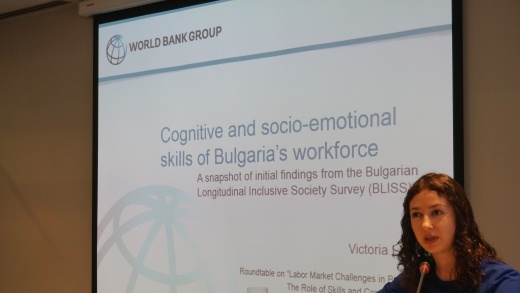A World Bank team of experts presents emerging findings from Bulgarian Longitudinal Inclusive Society Survey (BLISS)
SOFIA, April 14, 2015 — What skills – cognitive and socio-emotional – matter in the labor market in Bulgaria? This was the guiding question in the Bulgarian Longitudinal Inclusive Society Survey (BLISS) conducted by the World Bank in partnership with the Open Society Institute (OSI)-Sofia, and presented today at the Round Table Discussion on Labor Market Challenges in Bulgaria: The Role of Skills and Competencies.
Organized by the Bulgarian Industrial Association in partnership with OSI-Sofia and the World Bank, the Round Table assembled representatives from governmental institutions and bodies, executives of sectoral organizations, social partners, the academia, HR managers of leading companies, and head-hunting agencies.
The preliminary findings of the survey show that while there are no significant differences in skills between men and women, or between urban and rural residents, certain skills gaps exist for other population groups. The data show that the skills mix changes across the lifecycle, with older adults exhibiting lower cognitive but higher socio-emotional skills related to socializing with others. As one might expect, both cognitive and socio-emotional skills are higher among individuals with higher educational attainment.
Cognitive and socio-emotional skills are also significantly tied to individuals’ employability. In fact, one emerging finding is that, in the case of men, skills seem to matter more than diplomas for finding a job, while for women educational attainment plays a more prominent role. In particular, people with higher cognitive skills are more likely to be employed, and cognitive skills play an important role for employment outcomes besides education. Notably, people with better socio-emotional skills, linked to their conscientiousness and ability to stay on difficult tasks, are also more likely to be employed.
“As a committed partner to Bulgaria, the World Bank will continue contributing to the national dialogue, bringing to the table new research and data, and evidence-based policy ideas,” said World Bank Country Manager for Bulgaria Tony Thompson. “Research shows that skills matter for individual success on the labor market, and, thus, they also matter for the economic development of Bulgaria.”
Thompson emphasized that, “In order to face the challenges of the aging and shrinking population, Bulgaria needs to consider skills development policies that can foster greater employability and productivity of current and future generations.”
According to Victoria Levin, World Bank economist and one of the main presenters at the event, “Employers in Bulgaria value cognitive and socio-emotional skills, such as the individual’s attitude towards work and willingness to learn new things. Helping people to achieve this skills mix will be very important for Bulgaria’s future, especially given the demographic trends in the coming decades. It is scientifically proven that many of the socio-emotional and cognitive skills are formed early in life – 0 to 5 years old – but some of the socio-emotional skills remain malleable throughout life. A comprehensive skills development policy of lifelong learning for all combined with targeted interventions for the disadvantaged would facilitate better labor market outcomes and a more inclusive and sustainable growth path.”

